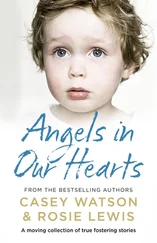Our Iowa roots are all Lindy and I have in common, but here, where no one wants to see the thing they have most in common, that is a lot. The distinct groups of women in the shelter only mix in the evening, the time of day when fear hangs most palpably in the air. During dinner we all gather around one table to marvel at each other’s tolerance or lack thereof of various spices, and then everyone drifts apart. Usually the Mexican women make their way to the picnic bench in the center of the courtyard; the Indian women gather around the benches near the sandbox; and the white women hang out in the lounge. Lindy, though, is a wild card. She calls her own shots. In here, she goes wherever she likes and no one says anything.
She is my only true friend precisely because of the way she asks Mary this question about the tree, bold so that she gets what she wants but with a sense of humor so that she can always say she was just kidding and take it back. She’s learned how to cover herself. I recognized this quality in her immediately and approached her with tentative determination, letting her know my intentions without seeming desperate. Neediness here is like a disease; no one wants to catch it.
At home, my two friends from my old job stopped calling. I was a receptionist at an all-women’s health spa despite my half-finished master’s in English that Jonathan nipped in the bud after a year and a half because it made him feel abandoned when I got lost in a book. “What are you escaping from?” he asked. It was easier to just not do it when he was around, and after a while he was around all the time, even when he wasn’t.
“Look what we have here, a new box of donations,” Lindy says, opening the donation closet next to the washer and dryer. She holds up a kerosene lantern. “In case we decide to join the snow women.”
Mary looks up from her toes. “Don’t start with that again, Lindy. I’m serious, it gives me the creeps.”
At dinner my second night here, Lindy told everyone a story about the women who burrow deep holes in the snow to keep warm when their husbands lock them out. She learned about these women from a resident in a shelter in Colorado where Lindy stayed when she was on the run the first time.
Lindy said these women dig snow caves with their bare hands. There’s a maze of underground snow tunnels, she said, and a network of women crawling on all fours, digging with chapped hands. They gather occasionally to light candles and warm their hands so that they can continue to burrow.
“Yeah, yeah,” Mary said. “We all got problems.” The other women, used to being invisible, had slipped away as Lindy was still talking.
“That’s exactly what I’m talking about,” she said to Mary.
“I like stories,” I said. “Stories are the best part.”
“The best part of what?” Lindy asked.
“Of everything,” I said.
“Where did you say you were from?” Lindy asked like she thought I was strange, but I knew by then she never asked questions for no reason. After the dishes were done, we sat silently on a neutral bench outside the office, underneath a vast, starry sky, each thinking her own thoughts in the pleasure of each other’s company. After a while I told her my parents were from Iowa and she told me her father was also from Iowa, and we considered that coincidence in an intimate kind of silence until a counselor came and told us it was time for us to go to our rooms.
Each item she finds in the lounge closet, Lindy holds up to us for inspection. There’s a barely inflated volleyball, bungee cords, heart-and flower-shaped cookie cutters, a meat thermometer, a battered game of Chutes and Ladders, a box boasting a tool that peels, cores, and slices apples.
“What are people thinking?” Lindy asks, prepared to provide her own answer. “This is the most useless assortment of crap I’ve ever seen. Check this out.” She holds up a tiny hourglass and places it on the table next to Mary so the sand begins to run down into the bottom funnel.
“Enough already,” Mary says, knocking the hourglass over with one of her feet.
“Candles and a corkscrew. Perfect, ” Lindy says, pointing to the sign above the washer and dryer: NO OPEN FLAME OF ANY KIND. NO ALCOHOL.
“Yeah, whatever. It’s your nails no matter what,” Mary says. She holds up a foot for our inspection. Mary believes that whatever happens, look good at all costs. The only time she cried was when she discovered she’d left her favorite lipstick — Rusty Rose — at home. “You can’t get it just anywhere,” she said, then quickly dabbed at her eyes with a Kleenex to catch the running mascara.
I sympathize with Mary’s obsession with what’s right in front of her, what she can see, what she can touch. Here in my third week, I speak carefully, over and around the details of my recent life with Jonathan, which seem beyond truth, beyond words. They are no longer just part of a story I tell, the story of how at the start I mistook jealousy for love. Instead, “Your nails look fabulous,” or “You look a little thin, bony around the hips.” We all talk primarily about the way we look, how we fill our skin. We line up to stare at our faces in the bathroom mirror, apply a tube of half-used lipstick rescued from the bottom of the cardboard box marked Shelter Makeup. We parade around for each other like stood-up teenagers desperate for someone to notice the predicament we’re in, the makeup a silly, useless weapon here where there are no men. Social anxiety exists here like anywhere else where people live communally, lurking under the surface of every exchange. We wander through the rooms of the shelter checking on everyone else, making sure no one has found a better form of distraction, making sure everyone is as miserable as we are.
The first night I was here, a woman called after me, “Hey, Maria, wait up,” and for a minute I felt wrapped in the strange comfort of a familiarity meant for someone else. “Oh, sorry,” the woman said when I turned around, not Maria. I had reached the point where I was willing to settle for recycled tenderness.
Lindy holds up her watch to indicate five minutes until ten o’clock. “I hope there’s an intake,” she says, laughing a little to show she feels guilty for saying it. She counts on the holidays, the season of peak family violence, to keep the counselor otherwise occupied so that the rule that says in our rooms by ten won’t be a priority.
“Nice,” Mary says, “real nice.” She flicks a toenail paring toward Lindy.
Lindy pulls up the legs of her jeans like a man in a suit about to sit down and squats by the bottom of the tree. She puts her finger in the top of the pole where the top of the tree is supposed to fit. Lindy hates to see things unfinished. The half-built birdhouse she left at home agonizes her. She carries the instructions in her pocket, a black pen mark underneath the step where she left off.
The rain has stopped as suddenly as it began. Through the window I watch as Anna wades slowly in her slippers through ankle-deep mud toward one of the courtyard picnic benches. Her two children, a seven-year-old boy and a four-year-old girl, circle her, splashing. Their toy guns shoot suction-cup darts that are supposed to stick but instead fall flat on the wet cement sidewalk. Joan’s dented-head little girl runs out to join them, making a gun out of her own hands, but Joan calls her back. Once she reaches the bench, Anna riffles through her bathrobe pocket for her cigarettes. A counselor rushes over, offering her a light, straddling the other side of the picnic bench, nervously centering the coffee can ashtray on the tabletop between them.
“I hope my husband gets shot so I can walk around in my bathrobe and counselors run after me to light my cigarettes,” Mary says, looking out the window. This afternoon Anna got a call from her mother in the Mexican town just over the border that Anna and her children had fled. Her mother told Anna that her husband had been shot and killed by another drug dealer. A counselor was brought in to tell the children just home from school while Anna hyperventilated in a back room. We all watched as the little girl, her arms still through the handles of her backpack, followed the counselor into the crisis room. When the counselor told the children their father was dead, the boy laughed and laughed. We could hear him though the door was closed. He couldn’t stop laughing. His laughter was like a sealant he sprayed all around the room, covering himself. Nothing more would ever get in.
Читать дальше












